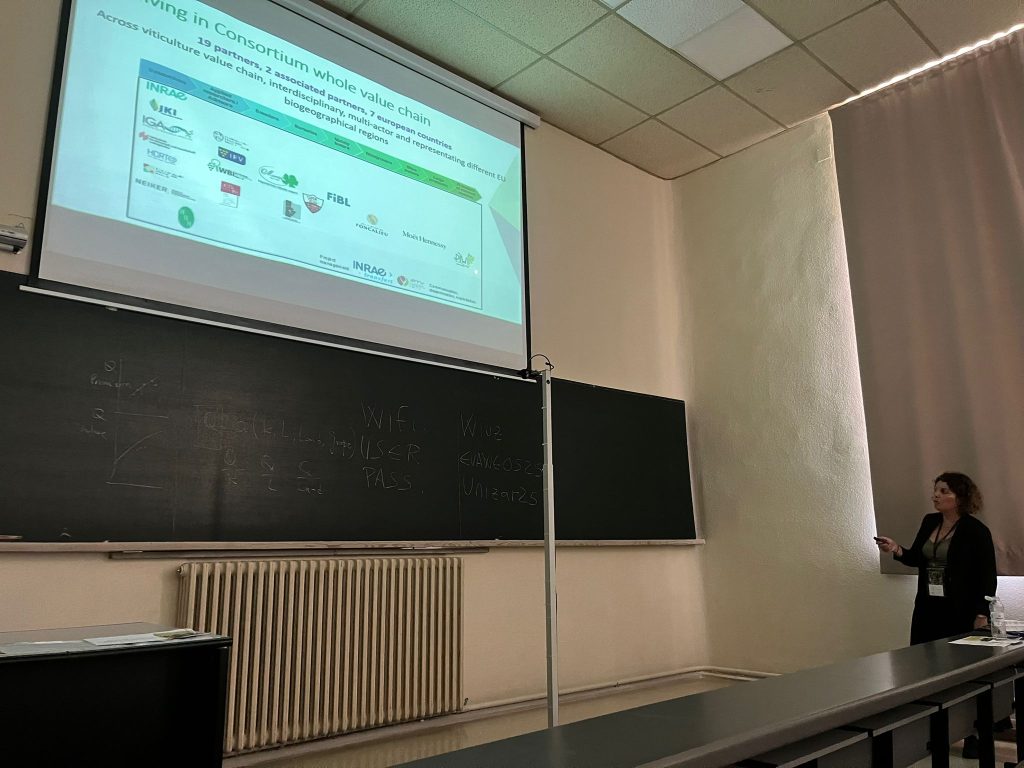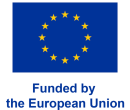The presentation “Towards Sustainable Viticulture: An Expert View on IPM, DRV/PIWI and Genetic Innovation” was held at the EUAWE Conference 2025 on the 14th-17th May 2025 by Katharina Kleiner, research associate and co-leader of Work Package 1 (WP1) in the Horizon Europe–funded GrapeBreed4IPM project. She presented key results from expert surveys and national panel discussions, conducted in collaboration with Prof. Marc Dressler, Professor at the University of Applied Sciences Ludwigshafen and leader of WP1.
The study explores expert perspectives on Integrated Pest Management (IPM), disease-resistant varieties (DRV/PIWI), and New Genomic Techniques (NGT) across six European countries. Although viticulture accounts for only about 4% of agricultural land, it uses nearly two-thirds of all fungicides, underscoring the urgent need for sustainable alternatives.
A key result: The estimated share of winegrowers currently applying IPM is, on average, just 43% across all surveyed countries. This low level of implementation highlights the need for coordinated action at the European level, particularly in light of increasingly ambitious environmental goals and regulatory pressure. Experts also expressed major concerns about the resilience of wine producers under stricter plant protection regulations. If conventional crop protection tools are further restricted without viable alternatives, a large share of vineyards across Europe could be at risk. In France, this risk was estimated to affect up to 90% of producers; in Italy, more than 50%. Similar concerns were expressed in other countries, confirming the urgent need for political, economic, and technological support. Country-specific priorities, France and Germany place stronger emphasis on social sustainability, while Spain stands out for its ecological focus. Italy follows a strategic path toward NGT, while DRV/PIWI is considered essential for future IPM approaches in countries like Germany.
In addition to the surveys, interactive panel discussions were conducted in all countries, identifying both shared barriers and national differences. These discussions informed concrete recommendations for action, including the need for harmonized policy frameworks, transparent communication, stronger economic incentives, and the active involvement of stakeholders along the value chain.
In the coming months, a cross-country roadmap will be co-developed using Design Thinking methods, aiming to create practical, innovation-oriented strategies for the successful integration of DRV/PIWI into European viticulture.
The presentation has already attracted great interest and highlights the strategic urgency of coordinated efforts to build a more sustainable and resilient wine sector in Europe.
More about GrapeBreed4IPM
GrapeBreed4IPM “Development of sustainable solutions for viticulture through multi-actor innovation oriented to genetic improvement for integrated pest management” started in April 2024 and will last 4 years, ending in March 2028.
The National Institute for Agronomic, Food and Environmental Research (INRAE) is leading the project in collaboration with 18 international partners and 2 associated partners: Julius Kühn-Institut – German Federal Research Center for Cultivated Plants; Istituto di Genomica Applicata; Edmund Mach Foundation; French Institute of Vine and Wine; Fribourg State Institute of Viticulture; INRAE Transfert; Ludwigshafen University of Business and Society; Rauscedo Cooperative Nurseries; Horta; Ministry of Economy, Transport, Agriculture and Viticulture; Wine Technology Platform; National Interprofessional Committee for Wines with Designation of Origin and Geographical Indication; NEIKER; Mercier, pépiniériste viticole; Association of German Grapevine Plant Producers e. V.; Working Group for the promotion of fungus-resistant grape varieties; Moët Hennessy; Institute of Primeneutics of Polopriverdi; the Research Institute of Organic Agriculture and Foncalieu Vineyards.
For its implementation, GrapeBreed4IPM has a budget of €5.000.000 received from the European Union under the Horizon Europe funding program (grant number 101132223), plus €600,000 received by an associated partner from the Swiss government.
























